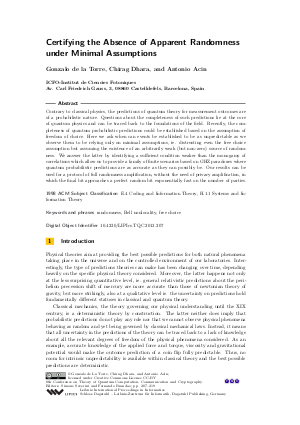Certifying the Absence of Apparent Randomness under Minimal Assumptions
Authors Gonzalo de la Torre, Chirag Dhara, Antonio Acin
-
Part of:
Volume:
8th Conference on the Theory of Quantum Computation, Communication and Cryptography (TQC 2013)
Part of: Series: Leibniz International Proceedings in Informatics (LIPIcs)
Part of: Conference: Conference on the Theory of Quantum Computation, Communication and Cryptography (TQC) - License:
 Creative Commons Attribution 3.0 Unported license
Creative Commons Attribution 3.0 Unported license
- Publication Date: 2013-11-13
File

PDF
LIPIcs.TQC.2013.207.pdf
- Filesize: 431 kB
- 13 pages
Document Identifiers
Subject Classification
Keywords
- randomness
- Bell nonlocality
- free choice
Metrics
- Access Statistics
-
Total Accesses (updated on a weekly basis)
0PDF Downloads0Metadata Views
Abstract
Contrary to classical physics, the predictions of quantum theory for measurement outcomes are of a probabilistic nature. Questions about the completeness of such predictions lie at the core of quantum physics and can be traced back to the foundations of the field. Recently, the completeness of quantum probabilistic predictions could be established based on the assumption of freedom of choice. Here we ask when can events be established to be as unpredictable as we observe them to be relying only on minimal assumptions, ie. distrusting even the free choice assumption but assuming the existence of an arbitrarily weak (but non-zero) source of randomness. We answer the latter by identifying a sufficient condition weaker than the monogamy of correlations which allow us to provide a family of finite scenarios based on GHZ paradoxes where quantum probabilistic predictions are as accurate as they can possibly be. Our results can be used for a protocol of full randomness amplification, without the need of privacy amplification, in which the final bit approaches a perfect random bit exponentially fast on the number of parties.
Cite As Get BibTex
Gonzalo de la Torre, Chirag Dhara, and Antonio Acin. Certifying the Absence of Apparent Randomness under Minimal Assumptions. In 8th Conference on the Theory of Quantum Computation, Communication and Cryptography (TQC 2013). Leibniz International Proceedings in Informatics (LIPIcs), Volume 22, pp. 207-219, Schloss Dagstuhl – Leibniz-Zentrum für Informatik (2013)
https://doi.org/10.4230/LIPIcs.TQC.2013.207
BibTex
@InProceedings{delatorre_et_al:LIPIcs.TQC.2013.207,
author = {de la Torre, Gonzalo and Dhara, Chirag and Acin, Antonio},
title = {{Certifying the Absence of Apparent Randomness under Minimal Assumptions}},
booktitle = {8th Conference on the Theory of Quantum Computation, Communication and Cryptography (TQC 2013)},
pages = {207--219},
series = {Leibniz International Proceedings in Informatics (LIPIcs)},
ISBN = {978-3-939897-55-2},
ISSN = {1868-8969},
year = {2013},
volume = {22},
editor = {Severini, Simone and Brandao, Fernando},
publisher = {Schloss Dagstuhl -- Leibniz-Zentrum f{\"u}r Informatik},
address = {Dagstuhl, Germany},
URL = {https://drops.dagstuhl.de/entities/document/10.4230/LIPIcs.TQC.2013.207},
URN = {urn:nbn:de:0030-drops-43112},
doi = {10.4230/LIPIcs.TQC.2013.207},
annote = {Keywords: randomness, Bell nonlocality, free choice}
}
